仁爱科普版(2024)七年级英语下册 Unit 11 Rules Matter! Thinking Skills & Reading Strategies 课件 (共19张PPT)
文档属性
| 名称 | 仁爱科普版(2024)七年级英语下册 Unit 11 Rules Matter! Thinking Skills & Reading Strategies 课件 (共19张PPT) |
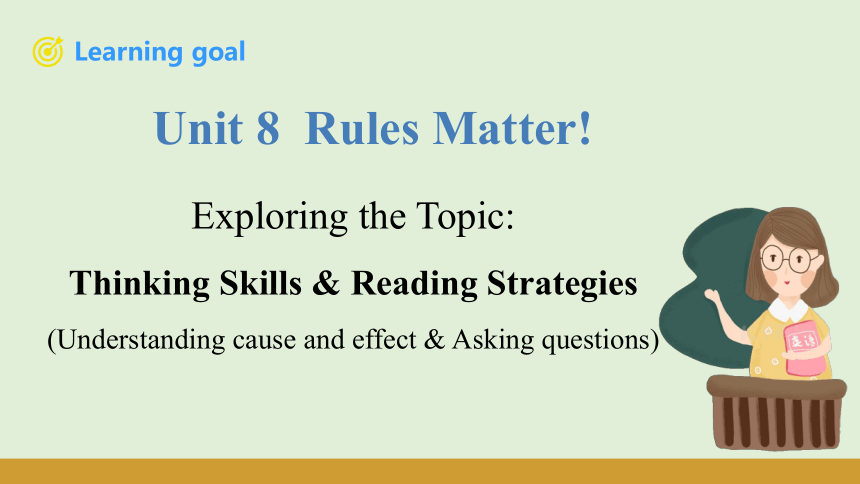
|
|
| 格式 | pptx | ||
| 文件大小 | 12.4MB | ||
| 资源类型 | 教案 | ||
| 版本资源 | 仁爱科普版 | ||
| 科目 | 英语 | ||
| 更新时间 | 2025-04-03 00:00:00 | ||
图片预览

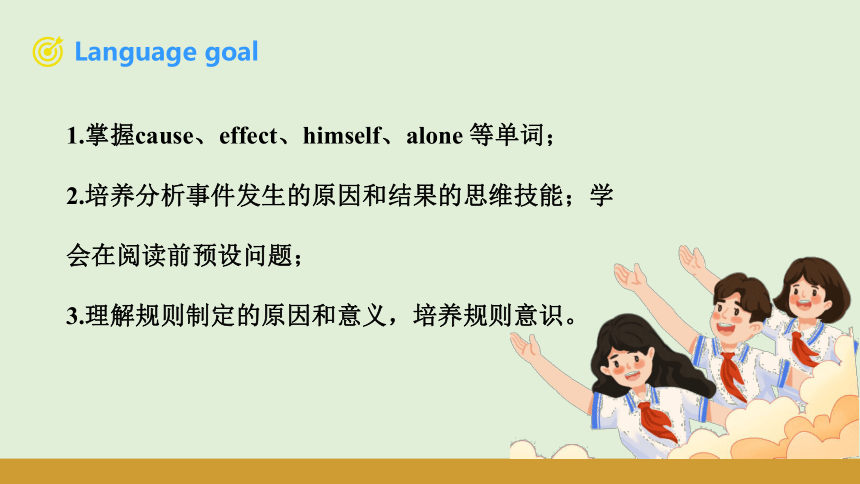

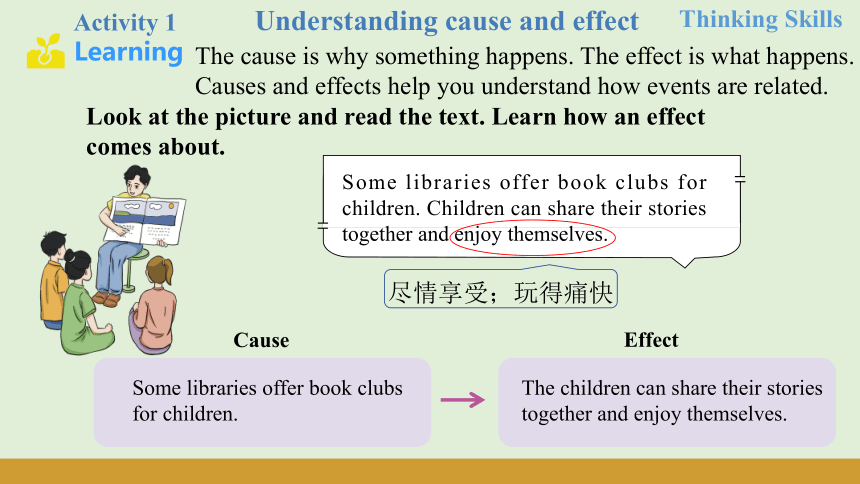
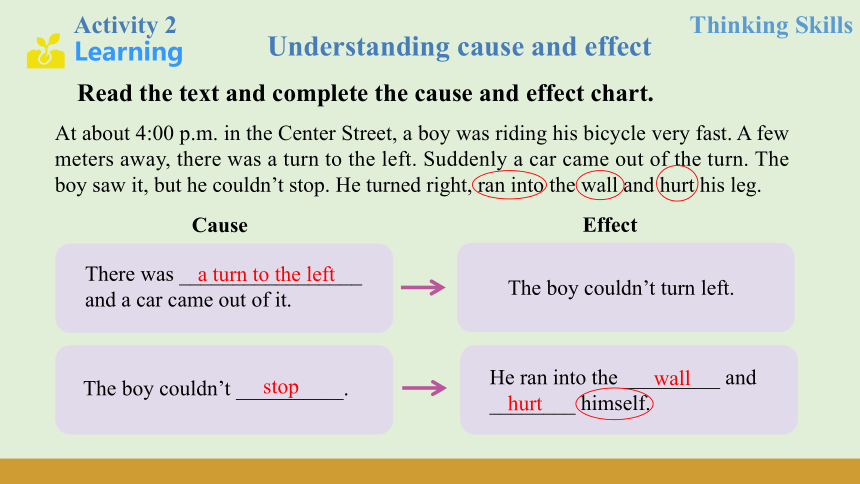

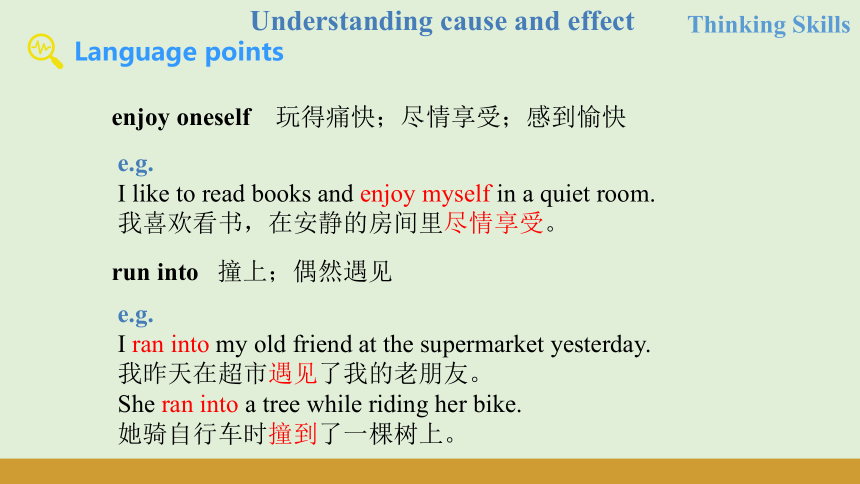
文档简介
(共19张PPT)
Unit 8 Rules Matter!
Exploring the Topic:
Thinking Skills & Reading Strategies
(Understanding cause and effect & Asking questions)
1.掌握cause、effect、himself、alone 等单词;
2.培养分析事件发生的原因和结果的思维技能;学会在阅读前预设问题;
3.理解规则制定的原因和意义,培养规则意识。
Free talk.
Effect
/ 'fekt/ n. 结果;影响
Cause
/k :z/ n. 原因,起因
v. 造成;引起;导致
We have many class rules.
Why should we have them
rules keep the class in order.
...
teachers can teach and students can focus.
...
Think more about it.
Activity 1
The cause is why something happens. The effect is what happens. Causes and effects help you understand how events are related.
Look at the picture and read the text. Learn how an effect comes about.
Some libraries offer book clubs for children. Children can share their stories together and enjoy themselves.
Cause
Effect
Some libraries offer book clubs for children.
The children can share their stories together and enjoy themselves.
Thinking Skills
尽情享受;玩得痛快
Understanding cause and effect
Activity 2
Understanding cause and effect
Read the text and complete the cause and effect chart.
At about 4:00 p.m. in the Center Street, a boy was riding his bicycle very fast. A few meters away, there was a turn to the left. Suddenly a car came out of the turn. The boy saw it, but he couldn’t stop. He turned right, ran into the wall and hurt his leg.
Cause
Effect
There was _________________ and a car came out of it.
The boy couldn’t turn left.
The boy couldn’t __________.
He ran into the _________ and ________ himself.
Thinking Skills
a turn to the left
stop
wall
hurt
Understanding cause and effect
Thinking Skills
cause n. 原因;起因
v. 造成;引起;导致
effect n. 结果;影响
wall n. 墙,墙壁;城墙
hurt v. (使)疼痛,受伤
himself pron. 他自己
单词 词性 释义
Understanding cause and effect
Thinking Skills
enjoy oneself 玩得痛快;尽情享受;感到愉快
run into 撞上;偶然遇见
e.g.
I like to read books and enjoy myself in a quiet room.
我喜欢看书,在安静的房间里尽情享受。
e.g.
I ran into my old friend at the supermarket yesterday.
我昨天在超市遇见了我的老朋友。
She ran into a tree while riding her bike.
她骑自行车时撞到了一棵树上。
Activity 3
Understanding cause and effect
Pair work. Talk about some other road accidents and find their causes and effects.
Thinking Skills
She ran a red light while crossing the street and was hit by a car.
她过马路时闯红灯结果被车撞。
cause: .
effect: .
ran a red light while crossing the street
was hit by a car
Activity 3
Understanding cause and effect
Thinking Skills
He was playing with his phone while crossing the street and didn't notice the red light, resulting in being hit by a car.
他过马路时玩手机没有注意到红灯,结果被车撞。
cause:
.
effect: .
playing with his phone while crossing the street and didn't notice the red light
being hit by a car
Asking questions
Activity 1
Read the poster again and answer the questions.
Reading Strategies
A good reader keeps on asking questions before, during and after reading. The questions can help you make predctions, better understanding the text, and think more about what is said.
Kangkang’s Family Rules
To help Kangkang develop some good habits, his parents made some rules for him.
Get up at 6:30 a.m. and tidy up the bedroom.
Go home at once after school.
Do homework on time and help with housework.
Go to bed at 10:00 p.m.
Kangkang tries his best to follow the rules because he knows the rules are good for him.
Questions;
1. What ...
2. Who ...
3. Why ...
家务劳动;家务事
整理好
起床
Asking questions
Reading Strategies
Questions;
1. What ...
2. Who ...
3. Why ...
Get up at 6:30 a.m. and tidy up the bedroom.
Go home at once after school.
Do homework on time and help with housework.
Go to bed at 10:00 p.m.
1. What rules did Kangkang's parents made for him
Who needs to follow these rules
2. Who made the rules
Kangkang's parents.
Kangkang.
3. Why did Kangkang's parents made rules for Kangkang
Questions;
1. What ...
2. Who ...
3. Why ...
To help Kangkang develop some good habits.
Why does Kangkang tries his best to follow the rules
Because he knows the rules are good for him.
Asking questions
Read the text and check your pre-reading questions, and then ask more questions while you are reading and after you read the text.
Activity 2
Reading Strategies
About the rules
About Kangkang
About yourself
When/ What...
How/Why ...
Does ...
Do/Can I ...
What/Why should I ...
Pair work. Raise some questions before, during and after reading the text and ask your partner to answer the questions.
Activity 3
Reading Strategies
Asking questions
Alone at Home
On a Sunday afternoon, I was doing my homework at home. Suddenly, there was a knock at the door. I went to the door and looked through the peephole. I saw a stranger. I remembered our family rule — don’t open the door for strangers. I decided not to answer the door and went back to do my homework.
A few minutes later, my mother called. She told me it was the delivery man and she was happy about it because I followed the family rule.
独自
陌生人
猫眼
送货员
A: What did I do when I heard someone knocking on the door
B:
A: Why didn't I open the door
B:
A: Why is Mom so happy
B:
I went to the door and looked through the peephole.
I decided not to answer the door and went back to do my homework.
Because I remembered our family rule — don’t open the door for strangers.
Because I followed the family rule.
你还能提出哪些问题?和同伴一起交流吧!
单词(短语) 词性 释义
Reading Strategies
Asking questions
housework n. 家务劳动;家务事
alone adv.,adj. 独自
peephole n. (墙或门上等的)窥视孔
stranger n. 陌生人
delivery n. 递送;传送;交付
get up 起床
tidy up 整理好
help with sth. 帮助做某事
根据汉语提示写单词。
1. We must follow the rules when we cross the road.(交通)
2. It's to talk loudly in the library.(不礼貌的)
3. The school has many , such as wearing uniforms on weekdays.(规则)
4. In a basketball game, players must the rules of the game.(遵守)
5. We should respect the people and give our seats to them on the bus.
(年长的)
traffic
impolite
rules
follow
elderly
We learn:
some words, such as cause, effect, alone, etc.
some phrases, such as enjoy oneself , etc.
ask questions before reading.
We can:
understand cause and effect.
follow traffic rules, family rules, etc.
1. Think about what family rules you have and write them down.
2. Finish the exercises.
Unit 8 Rules Matter!
Exploring the Topic:
Thinking Skills & Reading Strategies
(Understanding cause and effect & Asking questions)
1.掌握cause、effect、himself、alone 等单词;
2.培养分析事件发生的原因和结果的思维技能;学会在阅读前预设问题;
3.理解规则制定的原因和意义,培养规则意识。
Free talk.
Effect
/ 'fekt/ n. 结果;影响
Cause
/k :z/ n. 原因,起因
v. 造成;引起;导致
We have many class rules.
Why should we have them
rules keep the class in order.
...
teachers can teach and students can focus.
...
Think more about it.
Activity 1
The cause is why something happens. The effect is what happens. Causes and effects help you understand how events are related.
Look at the picture and read the text. Learn how an effect comes about.
Some libraries offer book clubs for children. Children can share their stories together and enjoy themselves.
Cause
Effect
Some libraries offer book clubs for children.
The children can share their stories together and enjoy themselves.
Thinking Skills
尽情享受;玩得痛快
Understanding cause and effect
Activity 2
Understanding cause and effect
Read the text and complete the cause and effect chart.
At about 4:00 p.m. in the Center Street, a boy was riding his bicycle very fast. A few meters away, there was a turn to the left. Suddenly a car came out of the turn. The boy saw it, but he couldn’t stop. He turned right, ran into the wall and hurt his leg.
Cause
Effect
There was _________________ and a car came out of it.
The boy couldn’t turn left.
The boy couldn’t __________.
He ran into the _________ and ________ himself.
Thinking Skills
a turn to the left
stop
wall
hurt
Understanding cause and effect
Thinking Skills
cause n. 原因;起因
v. 造成;引起;导致
effect n. 结果;影响
wall n. 墙,墙壁;城墙
hurt v. (使)疼痛,受伤
himself pron. 他自己
单词 词性 释义
Understanding cause and effect
Thinking Skills
enjoy oneself 玩得痛快;尽情享受;感到愉快
run into 撞上;偶然遇见
e.g.
I like to read books and enjoy myself in a quiet room.
我喜欢看书,在安静的房间里尽情享受。
e.g.
I ran into my old friend at the supermarket yesterday.
我昨天在超市遇见了我的老朋友。
She ran into a tree while riding her bike.
她骑自行车时撞到了一棵树上。
Activity 3
Understanding cause and effect
Pair work. Talk about some other road accidents and find their causes and effects.
Thinking Skills
She ran a red light while crossing the street and was hit by a car.
她过马路时闯红灯结果被车撞。
cause: .
effect: .
ran a red light while crossing the street
was hit by a car
Activity 3
Understanding cause and effect
Thinking Skills
He was playing with his phone while crossing the street and didn't notice the red light, resulting in being hit by a car.
他过马路时玩手机没有注意到红灯,结果被车撞。
cause:
.
effect: .
playing with his phone while crossing the street and didn't notice the red light
being hit by a car
Asking questions
Activity 1
Read the poster again and answer the questions.
Reading Strategies
A good reader keeps on asking questions before, during and after reading. The questions can help you make predctions, better understanding the text, and think more about what is said.
Kangkang’s Family Rules
To help Kangkang develop some good habits, his parents made some rules for him.
Get up at 6:30 a.m. and tidy up the bedroom.
Go home at once after school.
Do homework on time and help with housework.
Go to bed at 10:00 p.m.
Kangkang tries his best to follow the rules because he knows the rules are good for him.
Questions;
1. What ...
2. Who ...
3. Why ...
家务劳动;家务事
整理好
起床
Asking questions
Reading Strategies
Questions;
1. What ...
2. Who ...
3. Why ...
Get up at 6:30 a.m. and tidy up the bedroom.
Go home at once after school.
Do homework on time and help with housework.
Go to bed at 10:00 p.m.
1. What rules did Kangkang's parents made for him
Who needs to follow these rules
2. Who made the rules
Kangkang's parents.
Kangkang.
3. Why did Kangkang's parents made rules for Kangkang
Questions;
1. What ...
2. Who ...
3. Why ...
To help Kangkang develop some good habits.
Why does Kangkang tries his best to follow the rules
Because he knows the rules are good for him.
Asking questions
Read the text and check your pre-reading questions, and then ask more questions while you are reading and after you read the text.
Activity 2
Reading Strategies
About the rules
About Kangkang
About yourself
When/ What...
How/Why ...
Does ...
Do/Can I ...
What/Why should I ...
Pair work. Raise some questions before, during and after reading the text and ask your partner to answer the questions.
Activity 3
Reading Strategies
Asking questions
Alone at Home
On a Sunday afternoon, I was doing my homework at home. Suddenly, there was a knock at the door. I went to the door and looked through the peephole. I saw a stranger. I remembered our family rule — don’t open the door for strangers. I decided not to answer the door and went back to do my homework.
A few minutes later, my mother called. She told me it was the delivery man and she was happy about it because I followed the family rule.
独自
陌生人
猫眼
送货员
A: What did I do when I heard someone knocking on the door
B:
A: Why didn't I open the door
B:
A: Why is Mom so happy
B:
I went to the door and looked through the peephole.
I decided not to answer the door and went back to do my homework.
Because I remembered our family rule — don’t open the door for strangers.
Because I followed the family rule.
你还能提出哪些问题?和同伴一起交流吧!
单词(短语) 词性 释义
Reading Strategies
Asking questions
housework n. 家务劳动;家务事
alone adv.,adj. 独自
peephole n. (墙或门上等的)窥视孔
stranger n. 陌生人
delivery n. 递送;传送;交付
get up 起床
tidy up 整理好
help with sth. 帮助做某事
根据汉语提示写单词。
1. We must follow the rules when we cross the road.(交通)
2. It's to talk loudly in the library.(不礼貌的)
3. The school has many , such as wearing uniforms on weekdays.(规则)
4. In a basketball game, players must the rules of the game.(遵守)
5. We should respect the people and give our seats to them on the bus.
(年长的)
traffic
impolite
rules
follow
elderly
We learn:
some words, such as cause, effect, alone, etc.
some phrases, such as enjoy oneself , etc.
ask questions before reading.
We can:
understand cause and effect.
follow traffic rules, family rules, etc.
1. Think about what family rules you have and write them down.
2. Finish the exercises.
同课章节目录
